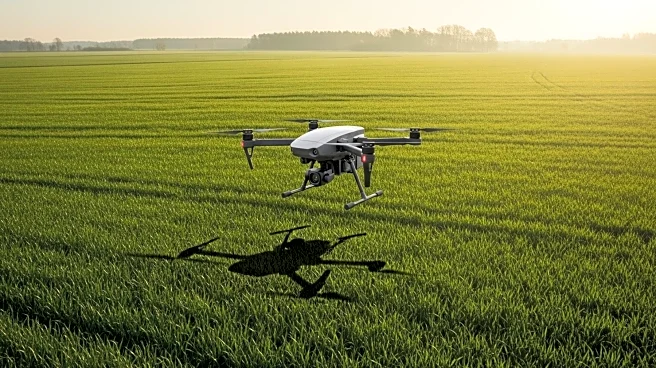What's Happening?
The Weed Science Society of America (WSSA) and the National Alliance of Independent Crop Consultants (NAICC) have joined forces to provide on-farm learning experiences for federal agency representatives. The initiative aims to improve understanding of the Endangered Species Act (ESA) and Integrated Pest Management (IPM) among professionals from the Environmental Protection Agency (EPA), U.S. Fish and Wildlife Service (USFWS), and the National Marine Fisheries Service (NMFS). The tours, held on September 23 and 24, 2025, in North Carolina and Virginia, included visits to several farms where participants learned about conservation practices and crop protection strategies. The event featured presentations from Virginia Tech University and North Carolina State Extension Specialists, focusing on the role of IPM in reducing pesticide use and improving soil health.
Why It's Important?
This collaboration is significant as it bridges the gap between federal agencies and agricultural practices, fostering a better understanding of how ESA requirements can be integrated into farming. By educating agency representatives, the initiative aims to facilitate more informed decision-making that balances environmental conservation with agricultural productivity. The discussions highlighted the economic challenges faced by farmers, emphasizing the need for cost-effective conservation practices. This effort could lead to improved policies that support both environmental sustainability and the economic viability of farms, benefiting farmers, regulatory bodies, and conservationists alike.
What's Next?
The ongoing dialogue between farmers, researchers, and federal regulators is expected to continue, with potential adjustments to ESA requirements that consider the economic realities of farming. Future collaborations may focus on developing more accessible conservation practices and technologies that can be adopted by farmers without significant financial strain. Stakeholders may also explore additional educational programs to further enhance understanding and cooperation between agricultural and environmental sectors.
Beyond the Headlines
The initiative underscores the importance of interdisciplinary collaboration in addressing complex environmental and agricultural challenges. It highlights the ethical responsibility of balancing food production with environmental conservation, a critical issue in the face of climate change and biodiversity loss. Long-term, this approach could lead to a cultural shift in how agricultural practices are perceived and implemented, promoting a more sustainable and integrated model of farming.










